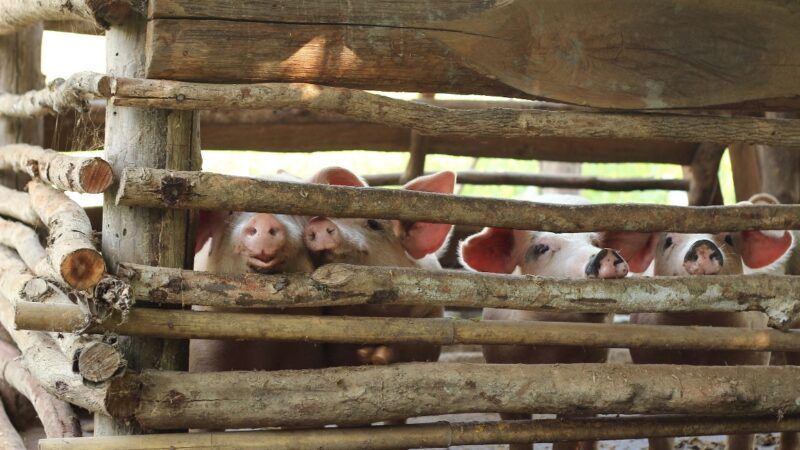Supreme Court Takes Up California's Attempt To Control How Other States' Farmers Treat Pigs
Do California's rules violate the dormant commerce clause?

Can the state of California control how farmers in other states raise their pigs? Today the Supreme Court said it will weigh in on the matter.
California voters in 2018 approved Proposition 12, a ballot initiative that banned the sale of pork and chicken if the livestock was not raised in pens large enough for the animals to move around freely. California residents eat lots of pork (13 percent of what is consumed in the United States), but the state produces only .3 percent of the national supply. And so Proposition 12 had the impact of forcing regulations (and significant costs) on farms outside California.
The National Pork Producers Council (NPPC) filed suit against the state, arguing that Proposition 12 violated the dormant commerce clause, the constitutional doctrine that forbids states from imposing regulations that interfere with interstate commerce.
A Supreme Court precedent from 1970, Pike v. Bruce Church Inc., concluded that overly burdensome regulations that control the circumstances by which food producers can ship goods to other states can run afoul of the commerce clause when they force significant costs on those producers with little actual benefit. The NPPC is leaning on that decision (and some others) to argue that Prop. 12 is unconstitutional.
California Attorney General Rob Bonta is defending the proposition (as is the Humane Society of the United States), noting that the law is not discriminatory (it treats pork producers within the state the same as those out of the state) and citing several top pork producers, such as Hormel and Tyson, that say they will be able to continue to meet the needs of California consumers. Bonta further claims, "Petitioners have not alleged that compliance with that restriction has caused 'massive and costly alteration[s]' or 'disrupt[ed] supply and demand nationwide.'"
But pork costs for consumers have skyrocketed nationally, and that's not entirely due to the current jump in inflation. Consumer prices in 2021 jumped about 7 percent over 2020, according to the U.S. Bureau of Labor Statistics. Around that same time, retail bacon prices jumped 23.7 percent. The differences in bacon prices between California and Florida are significant. According to Instacart, a pound of Oscar Mayer bacon costs $11.49 at Los Angeles grocery stores. A Wal-Mart in Orlando, Florida, is charging $6.98 for the exact same slab from Oscar Mayer.
Bonta argues that California voters were informed that the passage of Proposition 12 could drive up pork prices in the state and voted for it anyway. True enough. But consumers outside of California didn't get a vote.
The libertarian Cato Institute has filed an amicus curiae brief supporting the pork industry, noting that California is putting producers on the hook for hundreds of thousands of dollars to construct compliant housing for pigs but has not provided any evidence that larger cages will actually advance animal welfare or reduce the risk of foodborne illnesses. The brief notes:
California could certify that in-state pork producers have raised their stock in a humane fashion and let California consumers put their money where their mouths are by choosing between humane instate pork and pork imported through interstate commerce. Such regulations would achieve California's interest in regulating intrastate pork production without excessively burdening interstate commerce. What California may not do is presume to prescribe agricultural practices for the entire United States. The Constitution vests that power in the U.S. Congress, not the people of California.
If the Supreme Court upholds Prop. 12, Cato notes that "7.5 million California voters will have successfully projected their moral standards onto the entire American populace." No doubt many of these voters would love to have done just that, but the Constitution does not allow it.


Show Comments (88)